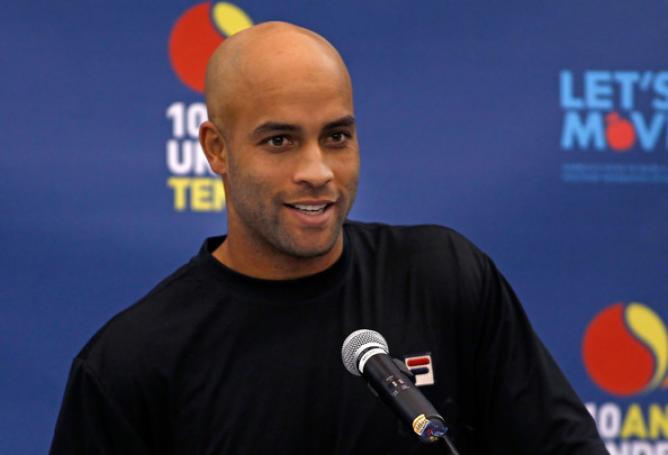This year’s U.S. Open was one for the ages. But the biggest story of the tournament wasn’t American Donald Young’s pair of epic 5-set comebacks, Aussie Lleyton Hewitt’s last US Open, Serena’s shocking upset, or the fact that Flavia Pennetta, the 26 seed, ended up winning the women’s tournament, becoming the oldest first-time major winner in the open era. What has gotten the most coverage is the assault and arrest of former tennis star James Blake outside of New York’s Grand Hyatt Hotel last week.
Blake was waiting outside of the hotel to be taken to the US Open for promotional appearances. It was at that point when, as shown in surveillance footage, he was swiftly tackled and taken into custody by a plain-clothed police officer. Blake’s crime? He fit the description of another man suspected of identity theft, which according to the FBI is classified as a white-collar crime. It wasn’t until someone on the street recognized Blake that he was released without so much as an apology from any of his arresting officers.
What is troubling about this whole ordeal sadly isn’t law enforcement’s continued lack of respect for black bodies or the harsh way in which they treat the citizens they are supposed to serve. These things, at least for me, are constant and harrowing realities that more people need to be made aware of. The most unfortunate thing about Blake’s arrest is that it was not, under any circumstances, supposed to happen to someone like him.
James Blake is a Harvard graduate and former tennis professional who broke his neck, contracted a debilitating form of shingles, and endured his father dying of stomach cancer — all in one calendar year, which caused his tennis ranking to fall all the way to 210th. In two short years though, he battled back to become #4 tennis player in the world. Not only that, but his autobiography was a New York Times bestseller, he has a charity aimed at fighting cancer, and currently serves as Chairman of the United States Tennis Association (USTA) foundation. If we employed the rhetoric from those who look at police brutality as an issue of self-respect, one would assume that an individual who has accomplished as much as Blake has would be immune from police harassment. Their logic dictates that education, money, and a nice wardrobe is to police officers what mosquito repellent is to mosquitoes.
It’s a cornerstone of the respectability politics crowd to contend that if you respect yourself, get an education, and dress professionally, the police will not bother you. They base this on the assumption that the police only go after criminals and people who dress like criminals. But Blake did not appear to have on sagging pants, Jordan’s, or any other urban clothing typically deemed “criminal attire.” I also don’t remember seeing white-collar criminals like Jordan Belfort, Jeffrey Skilling, or even Bernie Madoff being handled in such a manner … and they actually committed crimes.
In times like these, wisdom usually comes from the most unlikely places. Who knew that to explain the futility of the black respectability movement that I would need to use a Bill Murray movie to do so? But I digress. If you’re still pretty hazy on how futile and dangerous respectability politics is in this day and age, there are just four words uttered by Murray in the movie ‘Meatballs’ that can help you better understand the reality of law enforcement’s relationship with the black community.
Those words are: It just doesn’t matter. That’s right, it just doesn’t matter. Murray used this phrase to motivate adolescents during a competition between two summer camps. But those words carry a lot of relevance here, in that whatever you try to do to differentiate yourself … it just doesn’t matter. Getting an education, having nice clothes, dedicating yourself to a life of service? Again, It just doesn’t matter. The cops who arrested Blake did not see him for what he accomplished on and off the tennis court. They just saw him as another nefarious black male, thus the harsh treatment and lack of respect shown to him.
The biggest problem with the way law enforcement treated Blake is that it unearths the notion of the inherent criminality of blackness in this country. The thought that what you do and what you wear somehow makes you better in the eyes of the law is a naive thought, one that should not be had by any person of color. If they can treat someone like Blake with such disrespect, what chance do I and other not-so-famous people of color have? The treatment of Blake and scores of other blacks throughout the years prove that respectability politics is dead, and that the people who steadily cling to those disproved notions are defending a criminal justice system that is — at its core still — very racist.










